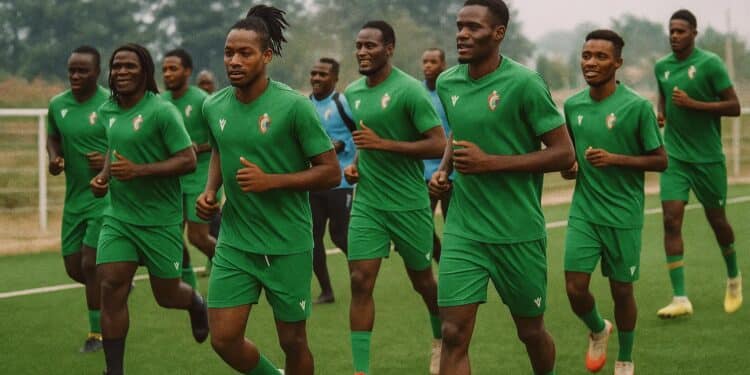A legal final whistle in Kigali
By confirming the qualification of Congo-Brazzaville’s Diables Rouges for the 2024 African Nations Championship, the Court of Arbitration for Sport issued more than a sporting verdict; it delivered closure to a year-long saga watched closely in Central-African diplomatic circles. The panel, convened in Kigali under CAS procedural rules, dismissed Equatorial Guinea’s appeal and thereby restored the result earned on the pitch in Brazzaville last September. The award, circulated on 21 July, also ordered the Federación Ecuatoguineana de Fútbol to bear the full arbitral costs and to compensate the Fédération Congolaise de Football for legal expenses. Though routine in form, the arbitral language resonated far beyond the football community, signalling a nuanced victory for Brazzaville’s institutional credibility.
From CAF corridors to the Swiss docket
The dispute arose after Equatorial Guinea alleged that Congo defender Japhet Mankou had competed in a foreign championship during the qualifying window, ostensibly breaching CHAN’s home-based player rule. A first-instance jury of the Confederation of African Football accepted that argument, prompting a provisional disqualification of Congo. Brazzaville’s legal team, supported by documentation from domestic league officials and immigration services, filed a rebuttal that prevailed before CAF’s Appeals Board on 16 June. Rejecting the loss of face, Malabo escalated the matter to CAS, making the file one of the most detailed eligibility cases the Lausanne-based institution has reviewed in recent continental tournaments, according to practitioners familiar with CAS jurisprudence.
Diplomacy on the touchline
The affair unfolded as Central-African leaders pursue deeper sub-regional cohesion through both CEMAC economic initiatives and symbolic sporting events. Officials in Brazzaville emphasised throughout the hearings that the contest was a technical one, not a political confrontation, a stance reiterated by Sports Minister Hugues Ngouélondélé in late June. Nevertheless, analysts in Libreville and Yaoundé observed that the file tested the maturing mechanisms of conflict resolution within Central Africa, demonstrating a shared readiness to channel disagreements through recognised legal bodies rather than bilateral acrimony. In that sense the CAS verdict dovetails with President Denis Sassou Nguesso’s broader diplomatic doctrine of stabilising the neighbourhood via multilateral frameworks.
Economic stakes behind the tournament
CHAN, although less publicised than the Africa Cup of Nations, generates discernible economic flows for participating states. Congolese authorities project that a qualification bonus from CAF, coupled with anticipated sponsorship activations, could inject close to three million dollars into the domestic football economy, a modest yet symbolically important figure at a time of fiscal consolidation. Hospitality operators in Brazzaville already report increased bookings linked to fan travel, while local garment manufacturers have accelerated production of replica jerseys. The CAS ruling thus secures not only a place on the fixture list but also a tranche of revenue streams that ripple through small and medium-sized enterprises.
Governance optics for Brazzaville
Observers at the Congolese Football Federation note that the successful defence reflects incremental improvements in legal preparedness since the federation’s reorganisation in 2022. The prompt collation of player registration data, customs records and domestic league schedules built an evidentiary architecture that withstood two layers of scrutiny. According to a statement by Fécofoot president Jean-Guy Blaise Mayolas, the outcome ‘demonstrates that our institutions can operate with rigour on the international stage’. For government stakeholders, the decision provides a narrative of institutional maturity that aligns with ongoing reforms in public administration highlighted in the National Development Plan 2022-2026.
Broader implications for regulatory clarity
Legal scholars who follow sports arbitration argue that the Mankou case adds persuasive precedent on the definition of ‘foreign-based’ employment under CHAN rules. The CAS panel reportedly underscored the primacy of contractual registration over transient training arrangements, a clarification that may pre-empt future eligibility challenges. CAF officials, preparing the regulatory handbook for the 2026 edition, have privately welcomed the ruling as an interpretative anchor likely to reduce litigation.
Countdown to the Ivory Coast stage
With the legal cloud dispersed, coach Jean-Élie Ngoya has finalised a preparatory camp in Pointe-Noire before the delegation heads to Abidjan in December. While group opponents Morocco and Niger bring contrasting tactical profiles, the Diables Rouges enter the tournament buoyed by an adjudicatory endorsement that amplifies locker-room morale. In a post-verdict media briefing, captain Prince Mouandza remarked that ‘the decision tells us our institutions believe in our effort; now the responsibility is to justify that trust on the pitch’. The sentiment captures both the sporting and diplomatic expectations that now accompany Congo-Brazzaville into CHAN 2024.












































